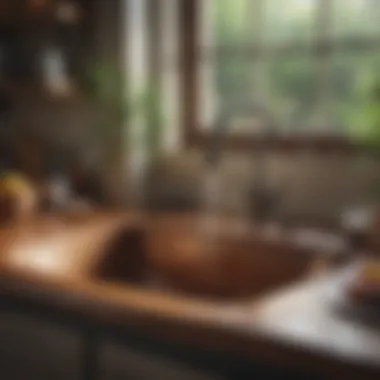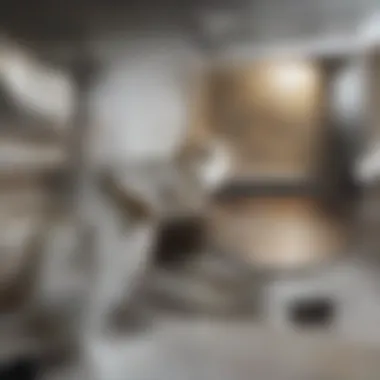Unclog Your Kitchen Sink Naturally: Eco-Friendly Solutions


Intro
Having a clogged kitchen sink can be frustrating. Especially when dishes pile up and water refuses to drain. Fortunately, you don't have to reach for toxic chemicals to fix this issue. In this article, you'll find various natural methods to effectively unclog your sink without harming the environment.
Emphasizing eco-friendly solutions allows us to maintain a green household while still addressing practical concerns. These methods leverage common household ingredients that offer a sustainable approach to unclogging. It's crucial to understand the various techniques and their effectiveness to support a healthier home environment.
Through this discussion, we will explore natural ingredients like baking soda, vinegar, and salt, and how they can be used individually or in combination to resolve those stubborn clogs. Let's delve into these solutions and equip you with the knowledge to tackle sink blockages naturally.
Understanding Kitchen Sink Clogs
Understanding kitchen sink clogs is essential to maintaining an efficient and harmonious cooking environment. Clogs can lead to delays in meal preparation, unpleasant odors, and potential water damage. Knowledge about this issue not only aids in effective maintenance but also instills confidence in managing minor plumbing problems.
A clog often begins as a minor annoyance. However, ignoring it can escalate into a major inconvenience. Proper comprehension of clogs enables homeowners to identify issues early and use natural solutions for resolution. This benefit is crucial in a world where environmentally friendly practices are becoming more valued.
Furthermore, awareness about the nature and causes of kitchen sink clogs fosters informed decisions about preventive measures. Implementing these preventive strategies can significantly enhance plumbing longevity. Moreover, being proactive helps reduce reliance on chemical drain cleaners that can harm both health and the environment.
"Understanding the root causes of clogs is the first step to effective management and prevention."
The process of unclogging a sink naturally becomes less daunting when one is equipped with knowledge. Through understanding, individuals can act decisively, ensuring their kitchen remains a functional and pleasant space.
Common Causes of Clogs
Kitchen sink clogs stem from various sources, and recognizing these can prevent future issues. One common cause is the accumulation of food waste. Leftover scraps, grease, and oil can build up in pipes, gradually narrowing the flow until blockage occurs. Regular removal of food residues before washing dishes is crucial.
Another significant factor is the use of improper disposal methods. Many people unknowingly dispose of materials like coffee grounds and eggshells in their sinks. These items can create sludge that complicates drainage.
The design of kitchen plumbing also plays a role. Pipes that are too narrow or angles that are too sharp can trap waste easily, exacerbating clog issues. Keeping this in mind can help in selecting the right tools and methods to address clogs.
Lastly, hair and soap buildup can also contribute significantly to clogging. Though more commonly an issue in bathroom sinks, kitchens also face this problem, especially when washing items like sponges and dishcloths.
By understanding these causes, individuals can adopt preventive measures, improving the overall health of their plumbing systems.
Environmental Impact of Chemical Drain Cleaners
The use of chemical drain cleaners may seem like an easy fix for kitchen sink clogs, but their environmental impact is significant. Many of these products contain harsh substances that can harm both the environment and human health. Understanding these implications is crucial when considering how to address plumbing issues effectively and sustainably.
Using chemical drain cleaners can lead to the contamination of local water supplies. When these substances are poured down the drain, they often do not fully break down in sewage treatment facilities. As a result, toxic chemicals can enter rivers and streams, affecting aquatic life and water quality.
Sustainable home practices involve finding alternatives that do not compromise environmental integrity. By opting for natural solutions, you minimize the risks associated with chemical runoff and pollution. This shift not only benefits the ecosystem but also contributes to the overall health of communities.
Health Risks Associated with Chemical Use
The health risks posed by chemical drain cleaners extend beyond environmental concerns. Many of these products contain corrosive materials, which can result in acute injuries upon contact with skin or mucous membranes. Inhalation of fumes can lead to respiratory problems, headaches, and other health issues. Regular exposure puts individuals, especially children and pets, at risk.
People may also face long-term health effects from prolonged exposure. For example, some chemicals have been linked to serious conditions, such as asthma or cancer. Given these risks, it is worth considering the health aspects of using chemical solutions versus natural methods.
It is essential for consumers to recognize labels and ingredient lists on drain cleaners and make informed decisions. Knowing the potential dangers helps in choosing safer alternatives, promoting a healthier home environment.


Effects on Plumbing Systems
Chemical drain cleaners can have detrimental effects on plumbing systems. These products can corrode pipes over time, leading to leaks and expensive repairs. Older plumbing systems, particularly those made of metal, are especially vulnerable to the strong chemicals found in these cleaners.
In addition to damage to pipes, these harsh substances can destroy beneficial bacteria in septic systems. These bacteria are essential for breaking down waste, and their disruption can lead to further plumbing challenges, such as backups or system failures.
Investing in natural unclogging methods protects plumbing systems, prolongs their lifespan, and reduces repair costs. By adopting more environmentally friendly cleaning practices, homeowners can avoid the long-term repercussions of using chemical drain cleaners.
"Conventional chemical solutions might seem effective initially but can lead to lasting damage and health risks."
Choosing natural alternatives can mitigate these concerns significantly and create a safer and more sustainable home environment.
Natural Remedies for Unclogging
Natural remedies for unclogging your kitchen sink offer an environmentally friendly approach to a common household problem. The use of harsh chemicals often leads to negative side effects, both for health and the plumbing system itself. By relying on natural ingredients, you can effectively tackle clogs while promoting sustainable practices. In this article section, we will discuss three natural methods: the baking soda and vinegar method, the salt and boiling water solution, and using dish soap and hot water. Each method has its specific benefits and considerations, allowing readers to choose what most suits their situation.
Baking Soda and Vinegar Method
The baking soda and vinegar method stands out as a popular choice for unclogging. This approach utilizes the chemical reaction between the two ingredients to break down grease and food particles.
To apply this method, first remove any standing water from the sink, if necessary. Then, pour about one cup of baking soda down the drain. Follow this with one cup of vinegar. You should observe fizzing as the two react. This reaction helps to dislodge clogs.
After allowing the mixture to sit for around 30 minutes, flush the drain with hot water. This step is crucial as it helps wash away any remaining debris. The primary advantages of this method include:
- Environmentally friendly: Both ingredients are common household items, reducing waste.
- Cost-effective: Using baking soda and vinegar is far cheaper than many store-bought chemical solutions.
However, consider that this method may not work for every clog severity. It is best for light to moderate blockages.
Salt and Boiling Water Solution
Salt combined with boiling water forms another efficient natural remedy. This method is particularly effective for minor clogs caused by grease buildup.
To use this method, heat water to a boiling point and measure around one cup of salt. Pour the salt directly into the drain before pouring in the boiling water. The heat from the water helps to melt grease, while the salt helps clear hard deposits.
It is essential to remember that this solution works best for recurring issues rather than severe drains. Benefits include:
- Easy to perform: It requires minimal ingredients and time.
- Accessible materials: Salt and water are standard supplies found in most kitchens.
Nonetheless, ensure to avoid this method on plastic pipes, as boiling water could potentially cause damage.
Using Dish Soap and Hot Water
Dish soap is often overlooked but can be incredibly effective in unclogging sinks. It can help loosen grease, making it easier for the blockage to flow down the drain.
Begin by pouring a generous amount of dish soap down the drain. Follow this with hot, not boiling water. The heat helps emulsify the grease while the soap acts as a lubricant. Allow the solution to sit for a few minutes before flushing the sink with more hot water to complete the process.
The benefits of using this method are:
- Gentle on plumbing: Dish soaps are designed for dishes, thus safe for household pipes.
- Effective: It acts as a preventive measure when used regularly.


Despite its advantages, it is essential to recognize that tasking this alone for a severe clog might not suffice. Combining it with other methods can yield better results.
Consider integrating multiple natural remedies for enhanced effectiveness. Each method has unique benefits, making them suitable for different types of clogs.
Preventive Measures for Clogs
In caring for a kitchen sink, prevention is key. Clogs can cause inconvenience and potential damage to your plumbing system. By applying preventive measures, homeowners can significantly reduce the frequency and severity of sink blockages. Understanding how to maintain your sink properly can save time, money, and frustration in the long run. The focus should be on regular habits and responsible practices, making it easier to enjoy a functional kitchen.
Regular Maintenance Tips
Regular maintenance is crucial for preventing sink clogs. Simple actions can make a big difference. Here are several recommendations:
- Run Hot Water: After each use, run hot water down the drain for about 30 seconds. This helps dissolve and push along any grease or food particles.
- Clean the Drain Stopper: Remove and clean the drain stopper frequently. Food debris can accumulate here, leading to blockages. A quick rinse can help keep it clear.
- Clear Out Debris: Monthly, inspect the drain area for any visible debris, such as hair or food particles. Removing these materials before they create a clog can prevent bigger problems.
- Use a Drain Strainer: Investing in a good quality drain strainer can catch food scraps and debris before they enter the pipe. This easy step can greatly reduce clog risks.
- Avoid Chemical Cleaners: Do not use chemical drain cleaners regularly. These options may seem effective but can damage pipes over time. Instead, consider natural solutions.
Regular habits can maintain the flow of water, ensuring your sinks serve you well.
Proper Disposal of Food Waste
Understanding food waste disposal is essential for keeping kitchen sinks unclogged. Many materials should never enter the sink. Here are important points to consider:
- Avoid Certain Foods: Fibrous foods like celery, potato peels, and eggshells can cause blockages. Dispose of these in a compost or trash bin.
- Grease and Oil: Do not pour fats, oils, or grease down the sink. These substances can solidify and cause significant clogs. Instead, collect used grease in a container and discard it appropriately.
- Limit Food Scraps: Even if you have a garbage disposal, avoid putting large quantities of food scraps into it at once. Introducing small amounts at a time can help to prevent overload.
By adopting proper disposal habits and practicing maintenance, you can effectively reduce sink clogs in your kitchen, leading to a cleaner, more functional space.
Diagnosing the Severity of Clogs
Understanding the severity of clogs is essential for choosing the right approach to resolve them effectively. Not all clogs are the same; some may require simple natural remedies, while others could necessitate more intensive measures or help from professionals. Recognizing the signs and symptoms associated with kitchen sink blockages can save time and prevent potential damage to plumbing systems. This section focuses on important elements related to diagnosing clogs, including the signs of a simple clog and how to identify severe blockages.
Signs of a Simple Clog
A simple clog often presents noticeable and manageable signs. Here are key indicators you might observe when dealing with a minor blockage:
- Slow Draining Water: If water pools in the basin or drains slowly, it may indicate a simple clog.
- Gurgling Noises: Unusual sounds from the drain can signal that air is trapped behind debris.
- Slightly Foul Odors: Sometimes, organic matter starts to decompose, leading to a mild odor that could be a sign of a minor blockage.
Recognizing these signs early can prevent a small clog from worsening. You might try basic remedies like using baking soda and vinegar to address these initial signs.
Identifying Severe Blockages
Severe blockages typically manifest through more pronounced symptoms and can lead to significant inconvenience or plumbing issues if not addressed promptly. Here are several telltale signs that indicate a severe blockage:
- Stagnant Water: If your sink fills up completely without draining, it indicates a serious block.
- Multiple Drain Issues: If more than one sink in your home is draining poorly, it could suggest a larger plumbing issue beyond a simple sink clog.
- Water Backflow: If water backs up into the sink or other plumbing fixtures, this indicates a severe problem that may involve professional assistance.
- Frequent Clogs: Regularly recurring clogs can suggest underlying issues requiring more extensive remedies.
Diagnosing the severity of clogs accurately can prevent damage and allow for the most effective unclogging methods.
Engaging properly with signs of severe blockages not only helps in treating the issue but also helps you in deciding if you need to call a plumbing service, especially with the risk of further plumbing damage looming.
Tools for Natural Unclogging


The journey to unclogging your kitchen sink naturally often begins with the right tools. While natural remedies such as baking soda and vinegar can address many minor clogs, having specific tools on hand makes the process easier and more efficient. Understanding which tools to use not only saves time but also helps in avoiding potential damage to your plumbing system. Using the correct tools enhances the effectiveness of natural remedies while ensuring a cleaner and safer environment.
Essential Tools for DIY Clog Removal
- Plunger: A standard tool in many households, the plunger can be quite effective for loosening clogs. The suction created by the plunger allows water and debris to move freely, helping to break up stubborn blockages. It is crucial to select a plunger with a flange for kitchen sinks.
- Drain Snake: This long, flexible tool is designed to reach deep into pipes to dislodge hair, food particles, and other debris. Using a drain snake can remove clogs without resorting to harsh chemicals.
- Baking Soda and Vinegar: While not a tool in the traditional sense, these two ingredients can work together effectively. Pouring baking soda followed by vinegar into the drain creates a fizzy reaction, often clearing up smaller clogs.
- Bucket: Keeping a bucket handy is essential for any DIY plumbing project. It can catch water and debris that may spill from pipes, helping to keep the area clean during the unclogging process.
- Gloves: While working on clogs, it’s wise to protect your hands. Wearing rubber gloves prevents the spread of germs and keeps your hands clean from any sludge or grime.
Alternative Tools to Consider
- Wet/Dry Vacuum: If you have one available, a wet/dry vacuum can be a valuable alternative. It can suck out excess water and debris, often providing a more direct way to tackle clogs.
- Coat Hanger: An old coat hanger, when straightened, can serve as a makeshift tool to pull out soft blockages. This is particularly useful for fishing out food particles lodged near the opening of the drain.
- Plumbing Auger: For more persistent clogs, a plumbing auger can be a better option than a basic snake. It has a more robust design and penetrates deeper into the plumbing.
- Oxygen Bleach or Enzyme Cleaners: These can be used as alternative solutions to chemical cleaners. They are less harsh on your plumbing and the environment and can help to naturally break down organic materials in your pipes.
- Flashlight: A simple but often overlooked tool, a flashlight can help you see the inner workings of your drain or any visible clogs. Proper lighting can guide your efforts during the unclogging process.
Using these tools can make the task of unclogging your kitchen sink not only easier but also more effective. The right equipment can save time and prevent unnecessary frustration.
When to Call a Professional
Knowing when to seek professional help can save time and avoid further damage. This stage of dealing with clogs is crucial. While many clogs can be resolved using natural methods, there are scenarios when a professional plumber is necessary. These situations often involve complex issues that require advanced tools or expertise.
Indicators of Professional Intervention
Several signs indicate that it is time to contact a plumbing service:
- Continuous Backups: If the clog persists despite multiple attempts to clear it, this may signal a severe blockage deeper in the plumbing.
- Gurgling Noises: Unusual sounds in the plumbing can mean air is trapped, which is often a marker of significant blockage.
- Multiple Clogs: Clogs occur in various sinks or drains simultaneously, showing a potential problem in the main sewer line.
- Unpleasant Odors: Foul smells can indicate decomposing waste trapped in the pipes, necessitating a professional’s attention.
- Water Damage: If there is water pooling under the sink or signs of leakage, immediate intervention is advisable to prevent structural damage.
Intervention by a professional not only restores functionality but also ensures that any underlying issues are diagnosed and remedied.
Choosing the Right Plumbing Service
Selecting a competent plumbing service is essential for effective resolution. When looking for a plumbing company, consider these factors:
- Reputation: Seek out services with good reviews online. Websites like reddit.com or local business pages can provide insights into customer experiences.
- Experience: A company with years of experience may have encountered various clogging issues. Their expertise often translates into efficient solutions.
- Licensing and Insurance: Verify that the plumbing service holds valid licenses and insurance. This protects you as a homeowner should any accidents occur during repairs.
- Transparent Pricing: Look for plumbing services that offer clear and upfront pricing. Hidden fees can lead to frustrating situations later.
- Customer Service: Evaluate how a company treats its customers. Good communication can often indicate a reliable service.
Effective preparation and proper research can make a significant difference in choosing the right professional help when needed.
By understanding when to call experts and how to select them wisely, homeowners can maintain their plumbing health and ensure a well-functioning kitchen.
The End
In the pursuit of a clogged kitchen sink, adopting natural solutions stands as a critical consideration. This article elucidates effective methods that prioritize eco-friendliness and practicality. Utilizing simple household ingredients not only addresses the immediate problem but also contributes to a broader commitment to sustainability.
Recap of Natural Solutions
Natural remedies, such as the baking soda and vinegar method or using salt and boiling water, have proven efficacy. Each method taps into the properties of common substances to dissolve blockages without the adverse effects posed by chemical cleaners. A review of these solutions includes:
- Baking Soda and Vinegar Method: Combines the reactive properties of the two ingredients to break down clogs effectively.
- Salt and Boiling Water Solution: Employs the abrasive nature of salt alongside hot water to flush away grease and debris.
- Using Dish Soap and Hot Water: This method leverages the greasing properties of soap, making it easier for blockages to disperse.
By employing these methods, homeowners not only solve their plumbing issues but also enhance their understanding of sustainable home maintenance practices.
Promoting Sustainable Home Practices
Embracing a sustainable approach in home maintenance encourages responsible choices that benefit both the environment and personal health. Each natural solution detailed here reflects a commitment to minimizing the use of harsh chemicals, which can have detrimental effects on plumbing systems and the ecosystem.
A few key points to consider include:
- The reduction of chemical runoff that can harm local water systems.
- The preservation of plumbing health, preventing corrosion and degradation.
- The encouragement of mindful consumption regarding home maintenance products.
Adopting these practices can lead to a more sustainable household. Simple actions, such as prioritizing natural methods for unclogging, contribute to long-term benefits for both homes and the environment.







